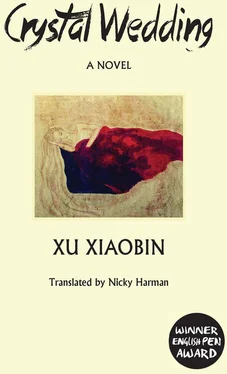Xiaobin Xu - Crystal Wedding
Здесь есть возможность читать онлайн «Xiaobin Xu - Crystal Wedding» весь текст электронной книги совершенно бесплатно (целиком полную версию без сокращений). В некоторых случаях можно слушать аудио, скачать через торрент в формате fb2 и присутствует краткое содержание. Год выпуска: 2016, Издательство: Balestier Press, Жанр: Современная проза, на английском языке. Описание произведения, (предисловие) а так же отзывы посетителей доступны на портале библиотеки ЛибКат.
- Название:Crystal Wedding
- Автор:
- Издательство:Balestier Press
- Жанр:
- Год:2016
- ISBN:нет данных
- Рейтинг книги:3 / 5. Голосов: 1
-
Избранное:Добавить в избранное
- Отзывы:
-
Ваша оценка:
- 60
- 1
- 2
- 3
- 4
- 5
Crystal Wedding: краткое содержание, описание и аннотация
Предлагаем к чтению аннотацию, описание, краткое содержание или предисловие (зависит от того, что написал сам автор книги «Crystal Wedding»). Если вы не нашли необходимую информацию о книге — напишите в комментариях, мы постараемся отыскать её.
Crystal Wedding — читать онлайн бесплатно полную книгу (весь текст) целиком
Ниже представлен текст книги, разбитый по страницам. Система сохранения места последней прочитанной страницы, позволяет с удобством читать онлайн бесплатно книгу «Crystal Wedding», без необходимости каждый раз заново искать на чём Вы остановились. Поставьте закладку, и сможете в любой момент перейти на страницу, на которой закончили чтение.
Интервал:
Закладка:
Tianyi was astonished at her dumpy little husband’s outburst and accompanying leap into the air. In any other circumstances, it would have been funny. But Niuniu was too small to find it funny and burst into terrified tears, which further ratcheted up the tension. Lian, apparently feeling guilty at having made his son cry, smothered his bad conscience with more shouting. Normally, Tianyi would have shouted back but she was so upset today that she did not have the energy to raise her voice.
She could not remember how long these appalling thunderclaps of rage had been going on. They were terrible, but on every occasion she tried to contain herself. She wished she did not have to, but having the whole building hear their rows was too shameful. She could not bear it, she was too thin-skinned. She never wanted to go out afterwards because the neighbours gave her peculiar looks. As if guessing how she felt, Lian had become more and more intemperate. His shouts grew louder and were punctuated with the sound of smashing crockery. Tianyi usually forbore to answer back but she was not a forbearing kind of person and, inwardly, she seethed with anger. Her health began to suffer: her chest felt tight, and her periods went haywire. Eventually, when she could not take his temper anymore, she forgot about keeping up appearances and would shout back at him. When the fight was over, she felt drained. She forced herself not to think, not to remember, because after each fight, Lian would go out of his way to make it up with her. He would become human again, as gentle and considerate as he had been when they were in love. He would make such an effort to coax her out of her mood that she felt there must be some hope left for them. And, over time, she grew used to this vicious circle.
That day, Tianke, Lian and Tianyue’s husband, Wei, put her aunt and uncle and their baggage on a goods tricycle and took it in turns to pedal them to the airport. They did not see a single taxi on the way.
At the end of June, it was as if peace suddenly descended on the country. This unearthly calm sometimes made Tianyi feel as if she could not breathe. At the Academy of Letters where she worked, the ferreting out of ‘dangerous elements’ was more or less finished, although a few matters remained to be ‘clarified’. Luckily, she was not a Party member, still less a government cadre and so, for her, matters were allowed to rest.
The worst of it was that it was time for Niuniu to go back to kindergarten. She was left not knowing what to do with herself, what she wanted to do, or could do. She simply could not write new stuff. She was reduced to digging out some old wool she had put by and knitting jumpers. In Lian’s view, knitting woollens in such hot weather was crazy, to say nothing of the fact that she was no longer a good knitter. What she knitted, she unpicked, what she had unpicked, she knitted again. Lian guessed aloud that she was missing Zheng.
She was not only missing Zheng. There was Di, and Jin too, friends she had been so close to that they could and did talk about anything. She felt they had all abandoned her. Niuniu was still a little boy, and she felt a depth of loneliness it was hard to put into words. The monotonous clacking of knitting needles helped to calm her fears and, as she knitted, then unpicked, unpicked and re-knitted, she was grateful to whoever had invented this simple, repetitive work.
At the beginning of July, a letter arrived that shattered her fragile calm; it was sent to her mother’s house. On the phone, her mother brought her up to date on what had been happening at home. Xiaolan had had her baby. It was a boy, and they were calling him Long. His birth was a ray of sunshine amid all the turmoil. Xiaolan, as the youngest and the pet of her family, knew all about pampering herself. So she put herself down for a hospital near where Tianyi lived, so that, as she put it, she could ‘eat Tianyi’s good food’. So Tianyi would have to cook for her every day and deliver meals to the hospital. She grumbled to herself that no one had treated her like that when Niuniu was born. Even if she had gone back home, her mother was never going to wait on her for her confinement month. It would just have triggered more rowing.
That was not all: her mother had something to get off her chest, and she, Tianyi, was going to be her confidante. Tianyi sensed that things had shifted. The family rows were no longer between herself and her mother, but mainly between her mother and Xiaolan and, secondarily, between her mother and Tianke. Tianyi was in the happy position now of being her mother’s ally, for the first time in over thirty years.
Her mother said a letter had arrived for her. She could come and pick it up. Tianyi knew her mother missed her, and wanted to talk to her, to re-hash the usual old stuff, and the letter was just an excuse but she went. Her reaction, when she opened the envelope, left her mother dumbfounded. She had never seen her daughter let her guard down and bawl her eyes out like that.
A sheet of paper had fallen from the letter, a photocopy of seven mugshots. The letter was from Peng, and the seven were all wanted by the police. Top of the list was Zheng.
It was Zheng’s familiar smile in the mugshot that set off the tears. He was such a good man, with a belief in heroism that belonged to another era. He wanted to be a hero, and so he imposed heroic demands on himself, always putting others above himself in a way that was rarely seen in this day and age. It was ridiculous, but he stuck to his guns, and if nothing else, it made him hugely popular. But what use was personal popularity? It was a fragile thing. Peng wrote in his letter that Zheng had been betrayed by his political friends, and more than once. It was as if he was committed to being betrayed, Tianyi thought, angry and distressed. Without Judas, where would Jesus have been?
Peng wrote that he had reliable information that Zheng had been detained at Changsha Bus Station, and was now being held incommunicado in Qincheng Prison. Coincidentally, Peng was the son of the famous entrepreneur for whom the boyfriend with the TV had worked. Peng was devoted to his studies but had inherited none of his father’s genius. He was the kind of person who turned his studies into a kind of mania, making them his whole life. Unfortunately, his results were no better than those of bright students who never put any effort in, the ones who coasted along, spending their time sunning themselves, playing tennis or chewing gum and just absorbing knowledge into their bloodstreams. The bright students had knowledge in their genes, and just learning one small thing allowed them to extrapolate the bigger picture. Zheng was a classic example. While poor Peng was a classic example of the other type.
But Peng never gave up. He was convinced that he could become a second Zheng. These troubled times would give him a chance him to display his prowess. He adored Tianyi, and had done for a very long time. His letter was like an elegy to revolutionary idealism. It contained a long poem, telling her of his staunch faith in the future and his undying love for her. He finished by telling her that he was hiding out in Shaoxing, had changed his name to Wang Lin, and was working for a small business. Could Tianyi send him some books? There was a list of books, including Marx and Hegel. Tianyi had the feeling that the list may have been as much for her to see as for him actually to read. The awkward-sounding foreign names made Tianyi’s head swim. Peng really was off his head. It was bad enough shutting himself away in a place like that. Why on earth didn’t he choose some light reading to cheer himself up? The romantic image of the revolutionary (male) hero who pored over Marxist-Leninist tracts with knitted brow was so old-fashioned. The nineteenth-century Italian ‘charcoal-burner’ societies were much more interesting (or at least less hypocritical) in this respect. The type of revolutionary Tianyi most loathed were the ones who were keenly aware of women as ‘other’, but who nevertheless pretended to genderless. She secretly suspected that Peng was one of these. But these were exceptional times and Peng was Zheng’s best friend, and she was bound to stick by him.
Читать дальшеИнтервал:
Закладка:
Похожие книги на «Crystal Wedding»
Представляем Вашему вниманию похожие книги на «Crystal Wedding» списком для выбора. Мы отобрали схожую по названию и смыслу литературу в надежде предоставить читателям больше вариантов отыскать новые, интересные, ещё непрочитанные произведения.
Обсуждение, отзывы о книге «Crystal Wedding» и просто собственные мнения читателей. Оставьте ваши комментарии, напишите, что Вы думаете о произведении, его смысле или главных героях. Укажите что конкретно понравилось, а что нет, и почему Вы так считаете.












